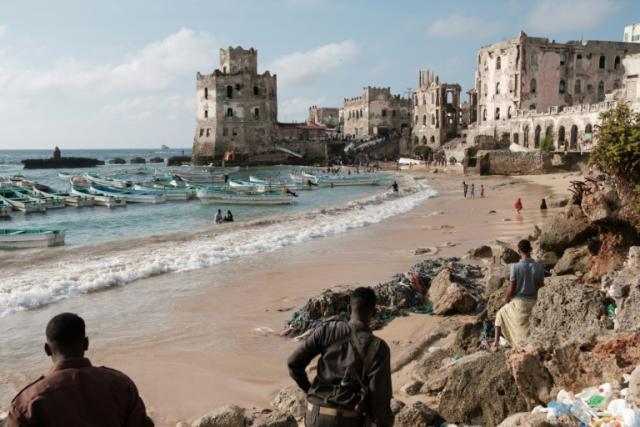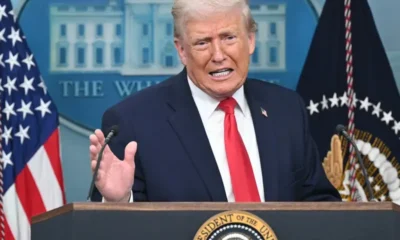Africa
Gulf Heavyweights Vie For Influence in African ‘Backyard’

By Robbie COREY-BOULET
Dancers and drummers swarmed the Saudi delegation from the moment they touched down in Somalia’s capital to launch new aid projects, part of the kingdom’s ramped-up outreach to the African nation.
Yet as they politely applauded agreements to provide stationery for schoolchildren and watering points for livestock, some Somali officials made clear they hoped Saudi engagement would go much further, including deeper into the security sphere.
Battered by decades of war and a bloody Islamist insurgency, Somalia these days “is in a process of state-building”, Abdifatah Mohamed, policy and planning director at the health ministry, told AFP during the recent one-day visit.
“We are building our armed forces for protection, we are rebuilding our economy. So in that regard, (the Saudis) can do more.”
Over the past year, through high-profile summits and humanitarian projects, Saudi officials have consistently shown a desire to “do more” in the Horn of Africa region abutting the strategically vital Red Sea.
This has been most visible in Riyadh’s hands-on response to the civil war that broke out last April in Sudan, which saw the Saudi navy deploy warships to rescue fleeing civilians as diplomats convened peace talks in Jeddah.
Analysts say such moves reflect the kingdom’s economic interest in Red Sea stability — coastal resorts are meant to become an engine of its nascent tourism industry — as well as a desire to push back against its rival the United Arab Emirates, which also wields intense influence in the region’s affairs.
“There’s this sort of cat-and-mouse game between the Emiratis and the Saudis in the region right now,” said Cameron Hudson of Washington’s Center for Strategic and International Studies.
“They’re leveraging their relationships with all of these regional states.”
– Meddling fears –
Officials from Saudi Arabia’s aid body, known as KSRelief, travelled to Somalia at a time of heightened concern about potential meddling by outsiders, especially the UAE.
On January 1, the breakaway region of Somaliland struck a deal that would grant neighbouring Ethiopia commercial and military access to 20 kilometres (12 miles) of its coast for 50 years.
In return, Somaliland officials say, landlocked Ethiopia would become the first country to recognise Somaliland as an independent nation — a development that would infuriate the federal government in Mogadishu.
Addis Ababa has not confirmed the terms.
The UAE’s close ties to both Ethiopia and Somaliland have fuelled suspicions of Emirati involvement in the deal — suspicions Hudson said were well-founded even if no “smoking gun” had emerged.
“The Emiratis have been, in all their relationships in the Horn, very directive,” he said.
Abu Dhabi, which did not respond to AFP’s request for comment, has already come under fierce scrutiny in Sudan, where UN experts have accused it of funnelling “military support” to the paramilitary Rapid Support Forces — a charge the UAE has denied.
Omar Mahmood, senior Eastern Africa analyst for the International Crisis Group, said he was not convinced the UAE was driving the Ethiopia-Somaliland deal because it could bring competition and other complications for the Somaliland port of Berbera, which is managed by Dubai’s DP World.
But he said the tensions it stirred nonetheless created opportunities for outside actors — including Saudi Arabia, Egypt, Qatar and Turkey — to deepen ties with Mogadishu.
Riyadh in January voiced “extreme concern” for Somalia’s “unity” and “sovereignty” — a position that Prime Minister Hamza Abdi Barre praised during the Saudi delegation’s visit to Mogadishu, drawing the loudest applause of the day.
– Deadly attack –
Even before the Somaliland dispute erupted, Saudi Arabia was angling for a closer relationship with Somalia, having appointed its first ambassador to the country in three decades in 2021.
Late last year, Somali President Hassan Sheikh Mohamud sent a close adviser, Owais Haji Yusuf Ahmed, to head up the Somali mission in Riyadh — a signal he wants to deepen ties.
With an African Union peacekeeping force set to complete a drawdown by the end of the year, Somalia is expected to lean heavily on Gulf countries for help training 22,000 army troops, as mandated by the UN Security Council.
Earlier this month, a Mogadishu attack killed four Emirati soldiers and one Bahraini officer tasked with training the Somali army. It was claimed by Al-Qaeda-linked Al-Shabaab militants.
“Somalia is also looking to import fresh weaponry following the lifting of the UN arms embargo in December, and may turn to countries in the Gulf for assistance,” said Mahmood of International Crisis Group.
Whichever direction the relationship heads, Saudi Arabia’s Gulf neighbours will be keeping close watch, Hudson said, given Somalia’s strategic significance and how it might affect the contest for influence in the wider region.
The way the Gulf countries see it, he said, the Horn of Africa “is their backyard”.
(AFP).
Kenya Insights allows guest blogging, if you want to be published on Kenya’s most authoritative and accurate blog, have an expose, news TIPS, story angles, human interest stories, drop us an email on [email protected] or via Telegram
-

 Americas6 days ago
Americas6 days agoEpstein Files: Bill Clinton and George Bush Accused Of Raping A Boy In A Yacht Of ‘Ritualistic Sacrifice’
-

 Business7 days ago
Business7 days agoCooking Fuel Firm Koko Collapses After Govt Blocks Sh23bn Carbon Deal
-

 Business6 days ago
Business6 days agoABSA BANK IN CRISIS: How Internal Rot and Client Betrayals Have Exposed Kenya’s Banking Giant
-

 Business3 days ago
Business3 days agoKRA Can Now Tax Unexplained Bank Deposits
-

 Investigations1 week ago
Investigations1 week agoPaul Ndung’u Sues SportPesa for Sh348 Million in UK Court, Accuses Safaricom Boss of Sh2.3 Billion Conspiracy
-

 Americas6 days ago
Americas6 days agoEpstein Files: Trump Accused of Auctioning Underage Girls, Measuring Genitals and Murder
-

 Investigations2 days ago
Investigations2 days agoEpstein Files: Sultan bin Sulayem Bragged on His Closeness to President Uhuru Then His Firm DP World Controversially Won Port Construction in Kenya, Tanzania
-

 Africa1 week ago
Africa1 week agoSafaricom Faces Explosive Market Abuse Claims as Ethiopia’s Telecom Giant Threatens Return to Monopoly
















